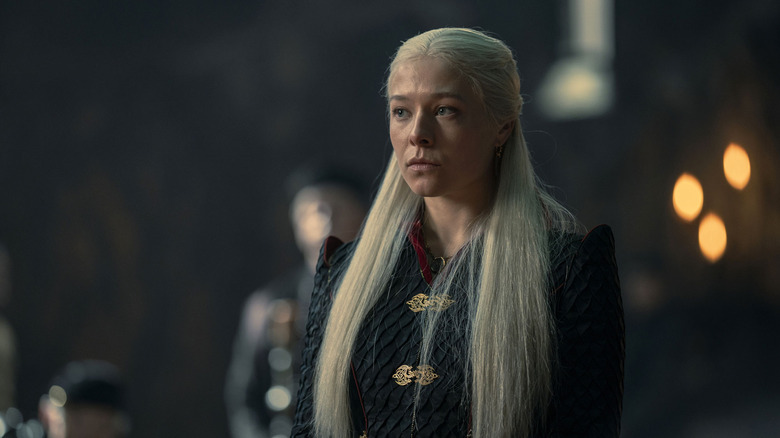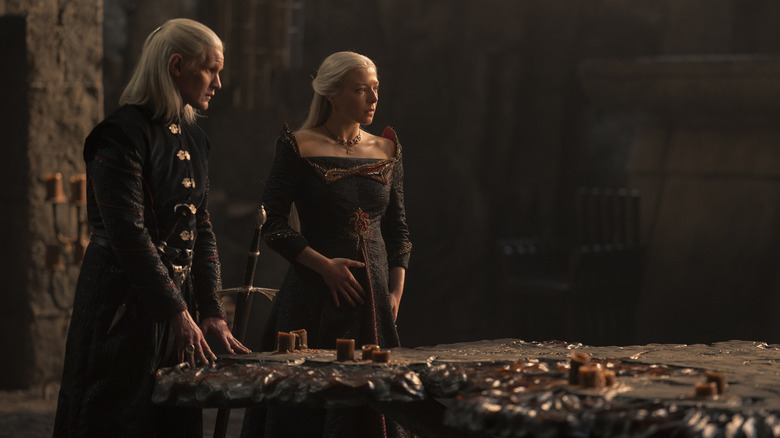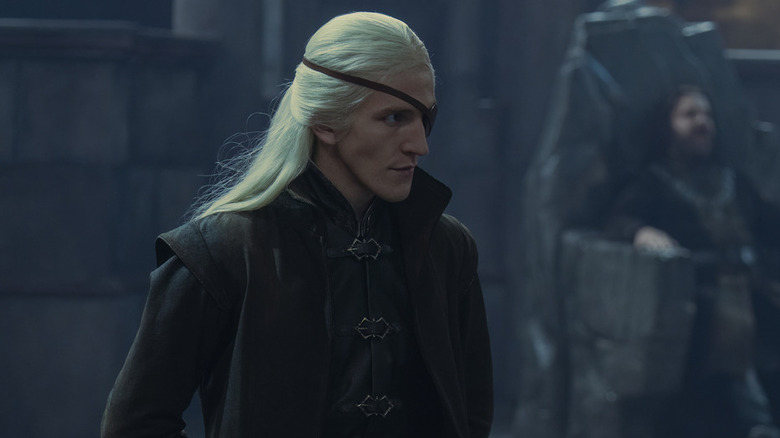Why House Of The Dragon's Season Finale Was The Best Episode Since The First Big Time Jump
When "House of the Dragon" first started, I was completely wrapped up in it. You had this story of a young princess who has the title of heir to the throne thrust upon her by her father and whose best friend ends up marrying that father. This was essentially a coming of age tale set within the world of palace intrigue and a brutal, patriarchal, medieval world. While it felt familiar to "Game of Thrones," it was carving out its own path. Then the time jumps started.
I began to feel like I was reading the CliffsNotes version or a Wikipedia summary of the story rather than experiencing it. We were "yada-yadaing" over character development, relationships, and shifts in the world's status quo. Plus, cast members were cycling in and out faster than British prime ministers, preventing any strong attachment to characters we probably should care about. By the time I was fully invested in Milly Alcock and Emily Carey as Rhaenyra and Alicent, they were promptly replaced by Emma D'Arcy and Olivia Cooke. It was a show I found myself not wanting to engage in because there was a strong possibility that the next episode would just blow past whatever was important in the previous one.
So, I came to the season 1 finale, "The Black Queen," with low spirits and prepared to be done with the show after wrapping up the season. To my wonderful surprise, this finale delivered on many of the things I had been missing since the first few episodes of the series. This was an episode filled with strong character motivation, clear storytelling, and a sense of lived experience for even the most minor characters. This was the point the show was racing towards, and they can finally settle down now that they're here.
Motivation is everything
The joys of serialized drama come from an understanding of the characters you have decided to follow for an indefinite period of time. If their decisions and actions aren't clear, then you are just watching plot points and not the stories of these people's lives. "The Black Queen" does an excellent job of establishing the motivations of its characters and having them do things that reflect those motivations. That may seem like basic storytelling, but that hasn't always been the case for the time-hopping "House of the Dragon."
Rhaenyra has had the weight of the realm on her shoulders since King Viserys named her heir and relayed Aegon's dream of "A Song of Ice and Fire." This is a position she has known she will eventually be in, but it's been about 20 years since then. In that time, the urgency of her impending power wanes, and when the time finally comes, she isn't immediately on top of her game to assume the massive responsibility of being queen, needing to ease herself into the role. You put that mentality opposite the hot-headed Daemon, who publicly pledges his loyalty but privately is threatened and angry about her power, and you have the perfect recipe for real dramatic character stakes.
But it goes beyond the series regulars. Rhaenyra's sons, Jacaerys and Lucerys, have basically been props for the power game, and we finally get proper insight into their heads, which is especially important considering Lucerys' fate. We actually see Jacaerys' conflict about how to rule from the wildly different teaching styles of his mother and step-father and Lucerys' reluctance to be apart of system he is only in out of obligation. Understanding what makes them tick makes us care about what they do and what happens to them.
Shading for the future
How I feel this season finale bolsters these characters may not retroactively increase my enjoyment of what came before, but it does leave me excited for the future. Take a character like Aemond, the eye-patched younger brother of "King" Aegon. This man, after a time jump, completely transformed into a cartoon villain, gleefully preening and longing for blood. This episode looked to be more of the same. I even laughed when I saw him on screen for the first time. But then Lucerys gets killed by Aemond's dragon Vhagar, and we see Aemond as a scared child whose insecurities took over his life. It's such a brief moment, but it said more about that character than entire episodes had previously. I could have never seen Aemond again and been fine, but this episode deepened and expanded his character in a way that made me incredibly excited to see what is next for him.
Season 1 has felt more like a prologue than a story to me, but now it seems we are finally in the tale Ryan Condal and the writers want to tell. If "The Black Queen" is a sign of things to come in how season 2 dramatizes its story, I cannot wait to get back to the mentality of being eagerly excited to fire up HBO Max every Sunday night to see the next chapter. As long as we don't go back to time-hopping and fast-forwarding through the "boring" parts of character growth, "House of the Dragon" will be in a wonderful spot.


